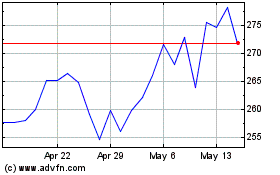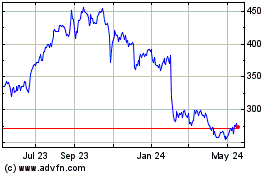By Shalini Ramachandran and Lisa Beilfuss
Cable operators have shown significant improvements in video
subscriber results so far in the third quarter, a development that
could moderate investors' concerns about the pace of pay-TV
cord-cutting.
On Thursday, Charter Communications Inc. said it added 12,000
video customers in the period, up from a loss of 9,000 in the
year-ago quarter. Time Warner Cable Inc., which is being acquired
by Charter pending regulatory approval, lost just 7,000 residential
video subscribers compared with 184,000 in the same period last
year. Earlier this week, industry giant Comcast Corp. also reported
it had substantially reduced its video subscriber losses.
Taken together, the results point to cable's growing ability to
retain its customers. Some analysts say the earnings highlight
that, while the entire pay TV ecosystem is in decline, cable
companies may be faring better than their satellite TV rivals.
The results could temper media investors' fears that
cord-cutting is accelerating, which were stoked after a dreadful
second quarter, when the overall pay TV industry lost 606,000
subscribers, compared with 321,000 the year earlier, according to
MoffettNathanson estimates and company reports.
Other pay-TV providers, such as Dish Network Corp. and
Cablevision Systems Corp., have yet to report third-quarter
results.
Analysts and executives caution that pay-TV subscriptions are
still declining, and note there are still some significant
headwinds.
On Charter's earnings call, Chief Executive Tom Rutledge said
some consumers are being priced out of cable. "Cost of the product
relative to what people's incomes have done is creating a
mismatch," he said. "The population is poorer," even as cable bills
continue to rise.
Mr. Rutledge said college students are increasingly sharing
their parents' passwords for using so-called "TV Everywhere" apps,
through which TV networks offer live or on-demand programming for
cable TV subscribers. TV networks are "devaluing the product by not
managing" their apps to protect against password-sharing, he said.
That has "reduced the demand for video" in the college market
"because you don't have to pay for it," Mr. Rutledge said.
Nevertheless, the latest results have been a pleasant surprise
to some on Wall Street. In a research note Thursday,
MoffettNathanson analyst Craig Moffett said cable firms have
benefited from their strength in broadband services, ability to
deliver robust video-on-demand services compared with satellite
services, and new cloud-based TV guides that give customers more
Weblike experiences may be helping.
Cable video "may not be such a dinosaur after all," he said.
Including AT&T Inc.'s and Verizon's results from last week,
the data points to an estimated annual decline in pay-TV
subscriptions of about one to two million, Sanford C. Bernstein
analyst Todd Juenger wrote in a research note Thursday.
That is "about the range most media investors *say* they're
comfortable with," he said. The number doesn't account for people
who are "cord-shaving," or downgrading to skinnier pay-TV packages,
which translates into lower revenue for cable operators and
networks left out of those bundles.
On Time Warner Cable's investor call, Chief Executive Rob Marcus
said 82% of new customers in the quarter signed up for the full TV
bundle. "For all the talk about skinny bundles, we are doing pretty
well offering a full video product," he said.
The operator this week began beta-testing a streaming TV service
for New York customers that offers the full bundle of channels but
without requiring a set-top box.
TWC's profit slipped 12% in its latest quarter as higher
expenses offset strong residential subscriber additions and higher
sales to businesses. The company reported net income of $437
million, or $1.53 a share, down from $499 million, or $1.76 a
share, a year earlier.
Overall, Charter swung to a profit of $54 million, or 48 cents a
share, compared with a year-earlier loss of $53 million, or 49
cents a share. The company enjoyed a $142 million tax benefit in
the latest quarter, versus a $59 million tax expense in the
year-earlier period.
Time Warner Cable in May agreed to be acquired by Charter
Communications Inc. for $55 billion. Mr. Marcus said it "feels
ambitious" for the deal to close by the end of this year, as the
companies had originally predicted.
Separately, Charter said it is "studying" participating in the
coming auction of airwaves by the Federal Communications
Commission, which could signal that it, like Comcast, has an
interest in entering the wireless business.
Anne Steele contributed to this article.
Write to Shalini Ramachandran at shalini.ramachandran@wsj.com
and Lisa Beilfuss at lisa.beilfuss@wsj.com
Subscribe to WSJ: http://online.wsj.com?mod=djnwires
(END) Dow Jones Newswires
October 29, 2015 14:08 ET (18:08 GMT)
Copyright (c) 2015 Dow Jones & Company, Inc.
Charter Communications (NASDAQ:CHTR)
Historical Stock Chart
From Jun 2024 to Jul 2024

Charter Communications (NASDAQ:CHTR)
Historical Stock Chart
From Jul 2023 to Jul 2024
